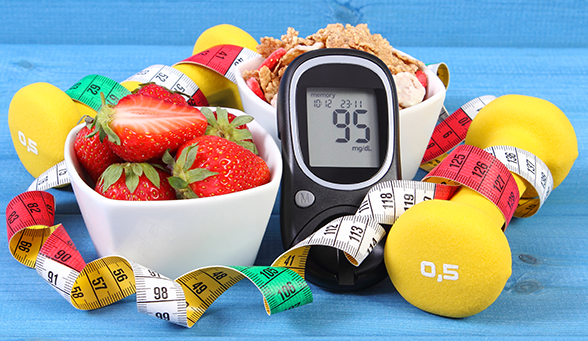Questions About Diabetes? We Have Answers!

What is Diabetes?
Diabetes is the seventh leading cause of death in the United States. Diabetes occurs when blood glucose levels are above average. With diabetes, the body may not make enough insulin, use the insulin in the right way, or both, causing blood sugar levels to be too high. If diabetes is uncontrolled, it can lead to many serious complications, such as:
- Heart Disease
- Stroke
- Kidney Disease
- Eye Disease
- Nerve Damage
What are the Different Types of Diabetes?
- Prediabetes – blood glucose levels are higher than normal but not high enough to qualify as diabetes.
- Type 1 Diabetes – The pancreas produces no insulin.
- Type 2 Diabetes – The pancreas doesn’t make enough insulin, or the body can’t use it effectively.
- Gestational Diabetes – Expectant mothers cannot make and use all the insulin they need during pregnancy.
What are the Risk Factors for Diabetes?
Type 2 diabetes is the most common form of diabetes. According to the Centers for Disease Control (CDC), 90-95 % of diagnosed cases are type 2 diabetes.
Risk factors for type 2 diabetes include age, obesity, family history, prior history of gestational diabetes, impaired glucose tolerance, physical inactivity, and race/ethnicity.
Certain ethnicities are at higher risk of developing type 2 diabetes. These include:
- African-Americans
- Hispanic/Latino-Americans
- Native Americans
- Hawaiian/Pacific Islands Americans
- Asian-Americans
Previously known as juvenile diabetes, type 1 diabetes is usually diagnosed in childhood. The exact cause of this disease is unknown; however, genetics and certain viruses may be contributing factors.
Gestational diabetes develops during pregnancy and can be controlled by eating healthy foods, exercising, and following your doctor’s treatment plan. Blood sugar levels usually return to normal soon after delivery. It’s important to see your doctor early in your pregnancy, or if you plan to become pregnant, as part of your overall childbearing wellness plan.
To see if you or a loved one are at risk for diabetes, the American Diabetes Association offers an online risk assessment.
What is the Treatment for Diabetes?
Healthy eating, physical activity, and insulin injections are the primary therapies for type 1 diabetes. The amount of insulin taken must be balanced with food intake and daily activities. Monitor blood glucose levels closely through frequent blood glucose testing to ensure they do not go too low or too high.
Like type 1 diabetes, the essential therapies for type 2 diabetes are healthy eating, physical activity, and blood glucose testing. Also, many people with type 2 diabetes require oral medication, insulin, or both to control their blood glucose levels from being too low or too high. Maintaining a healthy diet will make you feel better. No matter how small, physical activity will help you gain control of your life and help fight the disease.
Can Diabetes Be Prevented?
Researchers are making progress in identifying the exact genetics and trigger predisposing some individuals to develop type 1 diabetes, but prevention remains vital.
Several studies have shown that regular physical activity can significantly reduce the risk of developing type 2 diabetes associated with obesity. Medically tailored meals help many Medicare Advantage members to manage their diabetes and other chronic conditions. GA Foods provides home-delivered meals to make it easy. Check with your health plan to see if you qualify for a medically tailored meal benefit!

Alexandria is the Senior Product Manager at GA Foods. She is a Registered Dietitian and has worked in clinical rehabilitation facilities and the post-discharge food industry. Her experience gives Alexandria unique insights into social disparities and how health is affected. She and her growing family live in Tennessee, enjoying the mountain air, gardening, and tending their chickens.

